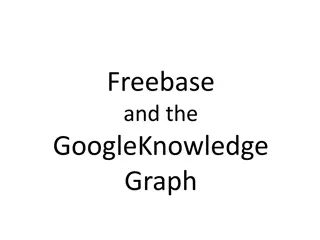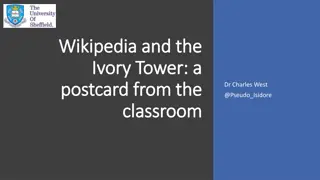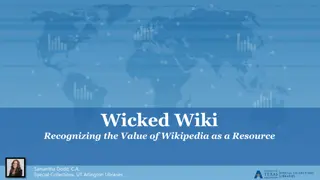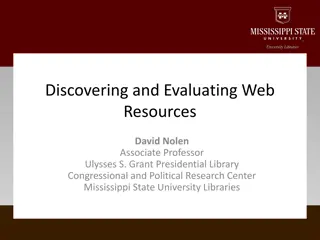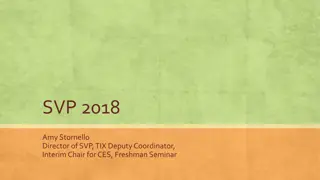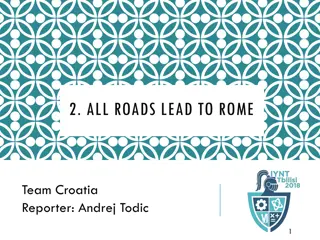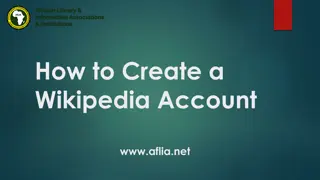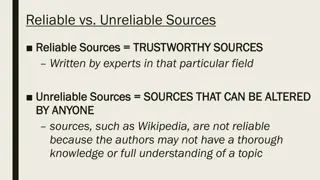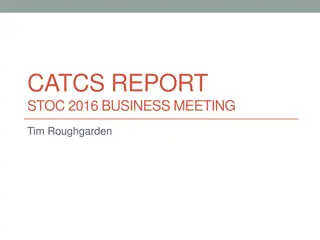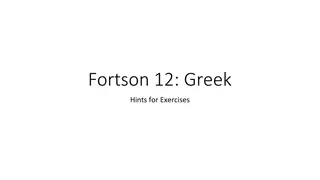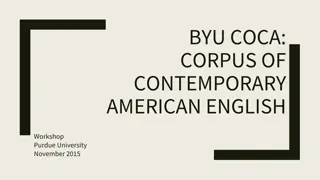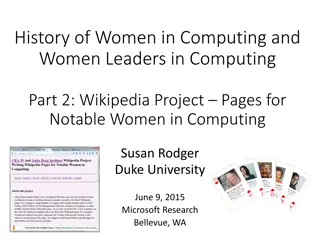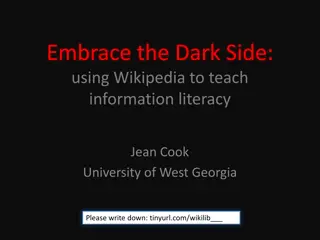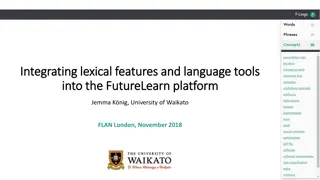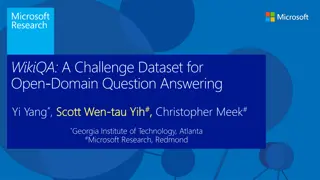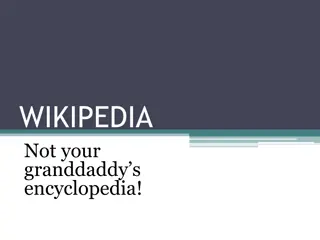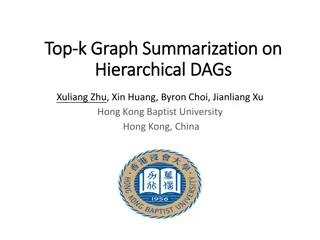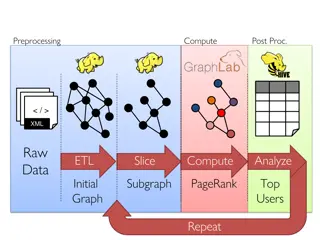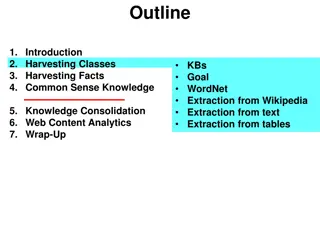Evolution and Demise of Freebase and the Google Knowledge Graph
Freebase was launched in 2005 as an open database of knowledge, initially populated with Wikipedia data and later incorporating crowdsourced updates. Acquired by Google in 2010, it was transitioned into Google's Knowledge Graph before being decommissioned in 2016. The schema contained around 1500 ty
4 views • 12 slides
Exploring Wikipedia in Education and History
Dive into the intersection of Wikipedia, education, and history with insights from Dr. Charles West. Discover how HST6089 redefines historical study, create/edit pages on figures like Charles Martel, and explore Histropedia for an enriched learning experience. Embrace the digital economy's impact on
4 views • 6 slides
Leveraging Wikipedia for Libraries: A Comprehensive Guide
Explore the value of Wikipedia as a resource for libraries and learn how to engage in projects like edit-a-thons to enhance accessibility, diversity, and information sharing. Discover training modules and useful links for librarians and archivists to optimize their involvement with Wikipedia.
0 views • 7 slides
Effective Strategies for Web Resource Evaluation in Student Research
Explore the importance of guiding students in researching online resources effectively. Discuss criteria for evaluating web sources, benefits, and drawbacks of common tools like Wikipedia and Google. Learn about quality resources from the Grant Presidential Library and essential considerations when
3 views • 8 slides
Insights from SVP 2018: Communication Trends, Student Impressions, and Generational Perspectives
Amy Stornello led the 2018 Student Volunteer Program as Director, showcasing a diverse group of students with international representation. The students demonstrated well-behaved conduct and a mix of communication styles, with cross-registered students primarily using oral communication. The incomin
0 views • 11 slides
Investigating the "All Roads Lead to Rome" Phenomenon: A Wikipedia Experiment
Explore the phenomenon where navigating different random Wikipedia articles eventually leads to the Philosophy page. The experiment involves clicking the first link in each article to trace a path towards Philosophy, testing hypotheses and analyzing results.
0 views • 28 slides
Step-by-Step Guide to Creating a Wikipedia Account
Follow these detailed steps to create your own Wikipedia account easily, including selecting a language, inputting a username and password, and entering your email address. Ensure a secure and unique username and password for a successful account setup.
0 views • 13 slides
Updates from CATCS: Current Initiatives and Future Plans
Committee for the Advancement of Theoretical Computer Science (CATCS) is actively engaged in promoting TCS, fostering communication, and interfacing with funding agencies. The current members include prominent figures in the TCS community. Check out their blog, TCS Jobs Site, and upcoming efforts, s
0 views • 9 slides
Understanding Reliable and Unreliable Sources for Research
Recognize reliable and unreliable sources for research. Reliable sources, such as books and peer-reviewed journals, are authored by experts in the field. Unreliable sources like Wikipedia and blogs can be altered by anyone. Learn how to evaluate the credibility of online sites based on their URLs an
0 views • 10 slides
Committee for the Advancement of Theoretical Computer Science (CATCS) - Overview and Initiatives
CATCS, the Committee for the Advancement of Theoretical Computer Science, plays a crucial role in connecting the TCS community with funding agencies and other research communities. Through various efforts like recruiting, serving on panels, and enhancing TCS entries on Wikipedia, CATCS aims to promo
0 views • 10 slides
Greek Phonology Exercises and Resources Overview
Explore Greek phonology exercises, resources like Wikipedia and Howe Library online, and key PIE sound transformations in Greek. Consult resources for laryngeal theory, Ancient Greek phonology, and Proto-Greek language.
0 views • 19 slides
Understanding COCA: Corpus of Contemporary American English Workshop Overview
COCA (Corpus of Contemporary American English) is a valuable resource for researchers and linguists containing a vast database of text types from various registers such as spoken, fiction, magazines, newspapers, and academic sources. This overview discusses the collection timeframe, interface, searc
0 views • 16 slides
Women in Computing: Pioneering Achievements and Visibility Challenges
Delve into the historical contributions of notable women in computing, including Susan Rodger and Fran Allen, and explore the disparities in visibility faced by women in the field, as exemplified by limited Wikipedia recognition.
0 views • 59 slides
Mastering Information Literacy with Wikipedia
Explore innovative ways to incorporate Wikipedia into information literacy education, discussing best practices, reliability issues, and ethical considerations. From evaluating sources to understanding citation rules, this presentation delves into critical concepts for students and educators alike.
0 views • 13 slides
Integrating Lexical Features and Language Tools into FutureLearn Platform by Jemma König
Explore the integration of lexical features and language tools into the FutureLearn platform as presented by Jemma König from the University of Waikato. Discover how F-Lingo enhances learning through identifying key words, phrases, and concepts in the text, providing definitions, example sentences,
0 views • 7 slides
WikiQA Dataset: Open-Domain Question Answering Challenges
WikiQA Dataset provides a challenge for open-domain question answering, focusing on identifying answers from large-scale knowledge bases such as Freebase and high-quality text sources like Wikipedia. The dataset includes questions sampled from search engine query logs, with candidate sentences sourc
0 views • 24 slides
Wikipedia: A Comprehensive Overview
Wikipedia is a multilingual, web-based, free-content encyclopedia project that allows collaborative editing by a community of volunteers. While Wikipedia has strengths such as timely coverage and wide-ranging topics, it also faces weaknesses like vandalism and bias. Research on Wikipedia emphasizes
0 views • 14 slides
Graph Summarization on Hierarchical DAGs
Explore top-k graph summarization techniques on Hierarchical Directed Acyclic Graphs (DAGs) like Disease Ontology, ImageNet, and Wikipedia Categories. Understand motivations for summarization, related works, and the kDAG-Problem. Discover algorithms, experiments, and conclusions for efficient graph
0 views • 38 slides
Data Processing and Analysis for Graph-Based Algorithms
This content delves into the preprocessing, computing, post-processing, and analysis of raw XML data for graph-based algorithms. It covers topics such as data ETL, graph analytics, PageRank computation, and identifying top users. Various tools and frameworks like GraphX, Spark, Giraph, and GraphLab
0 views • 8 slides
Understanding Knowledge Bases and Harvesting Information
This content delves into the concept of knowledge bases, exploring how information is harvested, consolidated, and analyzed. It covers the extraction of data from various sources like WordNet, Wikipedia, and web content, providing insights into classes, facts, and common sense knowledge. The goal is
0 views • 23 slides
